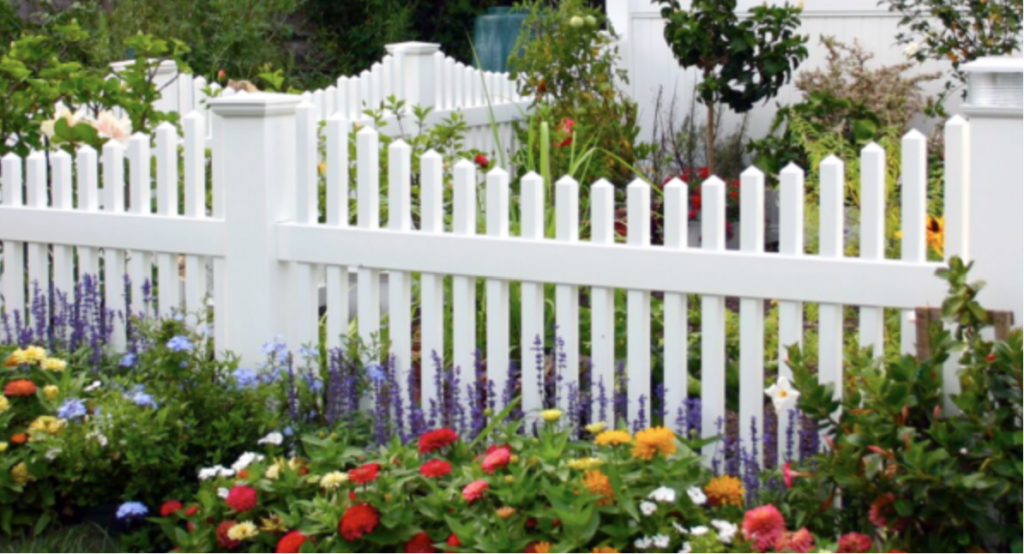When it comes to adding fencing to your property, you have many choices these days. From wood to metal and chain-link to composite, the options can be overwhelming. However, one popular option that stands out in terms of durability, aesthetics, and low maintenance is Vinyl (PVC) fencing.
But before we dig into the pros and cons of this material, let’s discuss the elephant in the room…the terms “vinyl fencing” and “PVC fencing” describe the same thing!
Both terms refer to fencing made from polyvinyl chloride (PVC) with added stabilizers and modifiers for durability and UV resistance.
Some key points to understand about this type of fencing:
- ⬥ Quality depends on additives: The ratio and type of additives used in manufacturing determine the fence’s quality and lifespan. Look for products that meet or exceed industry standards like ASTM F964-13(2019).
- ⬥ Marketing and branding: “Vinyl” is often used to sound more appealing than “PVC.”
- ⬥ Focus on standards, not labels: Don’t get hung up on the terms “PVC” or “vinyl.” Instead, check for industry standard certifications or ask about adherence to ensure quality.
Additional factors to consider:
- ⬥ Post and rail thickness
- ⬥ Co-extrusion vs. mono-extrusion:
Co-extrusion offers better strength and outdoor resistance. The term describes a manufacturing process that combines two or more materials to create a single product.
This process results in stronger and more durable products than those made from a single material.
By using multiple materials in a single product, co-extrusion creates products that are stronger, more resilient, and better suited to withstand harsh environments.
Pros
1. Durability
One of the biggest draws of PVC/vinyl fencing is its impressive durability. Unlike wood, it won’t rot, warp, or succumb to pesky insects. This translates to low maintenance, saving you time and money compared to constantly staining and repairing a wooden fence.
And let’s not forget the budget-friendly aspect. While the initial cost might be higher than wood, its longevity and minimal maintenance often make it a more cost-effective choice in the long run.
2. Good range of options
It boasts a surprising amount of versatility. From picket fences to privacy fences and even wood-grain textures, you can find styles to match your home’s aesthetic and personal taste.
In addition, its lightweight nature makes it DIY-friendly for the handy homeowner.
Cons
1. Environmental concerns
While vinyl fencing offers several practical advantages, it’s not without its drawbacks. One concern is its composition.
PVC, the main ingredient, raises questions about chemicals and potential environmental impact during production and disposal. While responsible manufacturers adhere to regulations, it’s a valid consideration for eco-conscious consumers.
2. Aesthetics
Compared to the natural beauty of wood, vinyl fencing can sometimes appear artificial. While advancements have led to more realistic textures and colors, the debate about its visual appeal continues. This is where personal preference comes into play.
3. Maintenance
While built to be durable, extreme weather can pose challenges for vinyl fencing. Warping, cracking, and fading are potential issues, especially in harsh climates. Consider your local weather conditions and choose a product with the right UV protection and thickness to address these concerns.
Also, unlike wood, repairing vinyl fencing can be difficult, sometimes even impossible. This limited repairability might be a turn-off for some homeowners who prefer the fix-it flexibility of wood.
Additionally, not all neighborhoods or communities welcome vinyl fencing due to regulations. Be sure to check local restrictions before making your decision.
Tips:
Navigating the world of vinyl fencing can be confusing, especially with claims and specifications thrown around. Here’s where industry standards come in, playing a crucial role in ensuring quality and performance. Look for products that adhere to ASTM standards like F964-13(2019), indicating they’ve passed rigorous UV resistance and durability testing.
4. Hidden Costs to Consider
Remember, the initial price tag isn’t the whole story. While DIY installation is possible, professional installation can add extra costs. Additionally, depending on your needs, you might require reinforcements or thicker posts, affecting the final price.
Finally, remember that vinyl fencing isn’t the only option. Consider alternatives like wood, composite, or metal fencing, each with pros and cons to weigh against your priorities.
So, is PVC/vinyl fencing right for you? Only you can say…the answer truly depends on your individual needs and priorities. Take your time, and dig deep into the fencing that you’re considering to ensure that you’ve got a product that will provide what you need, both aesthetically and financially!
What To Know Before You Install a Fence


